Press Releases
Sonderforschungsbereich bewilligt
DFG fördert die Forschung im RAPP Center mit ca. 11 Millionen Euro zur Untersuchung des Wechselspiels der kosmischen Materie
Am nächtlichen Sternenhimmel sehen wir mit dem bloßen Auge Jahr für Jahr die gleichen Konstellationen, so dass der Eindruck entstehen könnte, es handele sich um ein statisches Konstrukt – ein Gedanke, der sich über Jahrhunderte hielt, bevor es Anfang des 20. Jahrhunderts gelang nachzuweisen, dass das Universum ein dynamisches System ist, das mit einem „großen Knall“ entstanden ist und sich immer weiter ausdehnt.
Auch auf kleineren Skalen ist die Dynamik hoch, Sterne entstehen und vergehen in mächtigen Supernovaexplosionen und beeinflussen so die Dynamik der Galaxien, in denen sie beherbergt sind. Durch die Explosionen entstehen Wolken von Teilchen oder aus Plasma, die mit kosmischen Magnetfeldern wechselwirken. Das Wechselspiel der kosmischen Materie, das diese Prozesse antreibt, ist Leitthema des Sonderforschungsbereichs (SFBs) 1491.
Pressemitteilung der DFG
SFB1491 - Cosmic Interacting Matters Website:
https://www.sfb1491.ruhr-uni-bochum.de/
News Archive
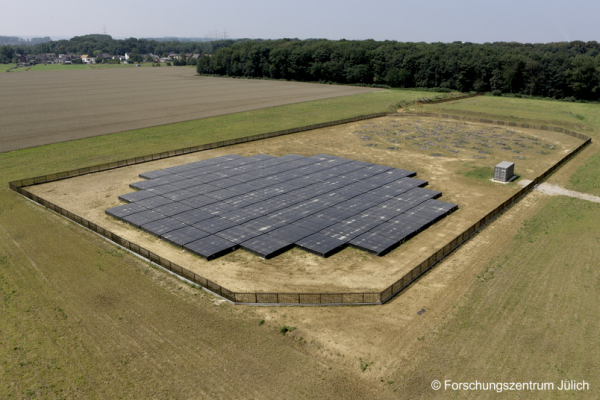
World's largest radio telescope gets its own legal form
The Low Frequency Array - LOFAR - is the world's largest radio telescope for measuring short and ultra-short radio waves from space. Together with the Forschungszentrum Jülich (FZJ), the Ruhr University Bochum operates a LOFAR antenna field close to the FZJ. Furthermore, RAPP member Prof. Ralf-Jürgen Dettmar played a key role in the founding of the International LOFAR Telescope (ILT).
Due to the Europe-wide importance of LOFAR, the European Commission has decided to give the telescope, which was previously organized as a project, an independent legal form: From January 22, 2024, the consortium was transformed into a European research infrastructure consortium (short: ERIC).
This reinforces the great importance of LOFAR for cutting-edge astronomical research.
Pressemitteilung
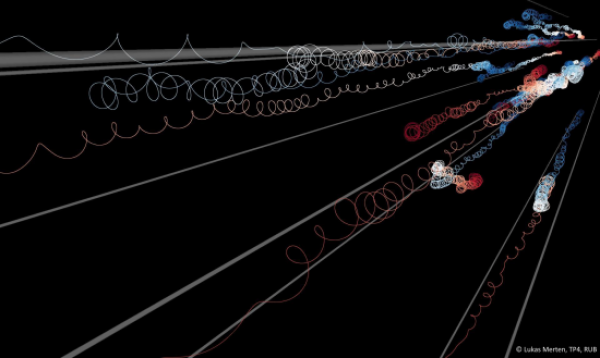
Understanding the theory of particles in plasmas
On Monday, January 22nd, scientists meet at RUB for the yearly meeting "Plasma and Particle Theory Day" to discuss the theory of particles in plasmas. Understanding the collective behavior of ionized particles is in the focus of research. A particular challenge is to understand how physical collisions of particles and the interactions between ions and electromagnetic fields are included in the various equations to describe the systems. In astrophysics, often these equations are dominated by the interaction of particles with electromagnetic waves. This is the research focus of the Collaborative Research Center SFB1491, "Cosmic Interacting Matters - From Source to Signal", centered at RUB. The research department of Plasmas with Complex Interactions also hosts SFB1316, "Transient Atmospheric Plasmas: From Plasmas to Liquids to Solids". Here, non equilibrium processes in atmopsheric plasmas for species conversion are the topic of research. Compared to astrophysical plasmas, these atmopsheric plasmas are very dense and physical collisions dominate the equations. It is the goal of the Plasma and Particle Theory day to move toward exploring the region in which both terms play a significant role. This is for instance the case in molecular clouds in the Milky way, in which the degree of ionization is as low as ~30% and naturally, collisions become important in the description. Another example is the physics of lightning that can be tested in the plasma lab and for which a briding theory is needed to understand the physics of atmospheric lightning. Once the particle interactions become inelastic, i.e at high energies or at extreme densities like they exist in neutron stars, the classical description needs to be replaced by the quantum mechanical one. Scientists therefore discuss the different methods, how synergies can be build and what the next steps are to build a consistent framework to combine classical and quantum-mechanical interactions.
Program of the Plasma and Particle Theory Day
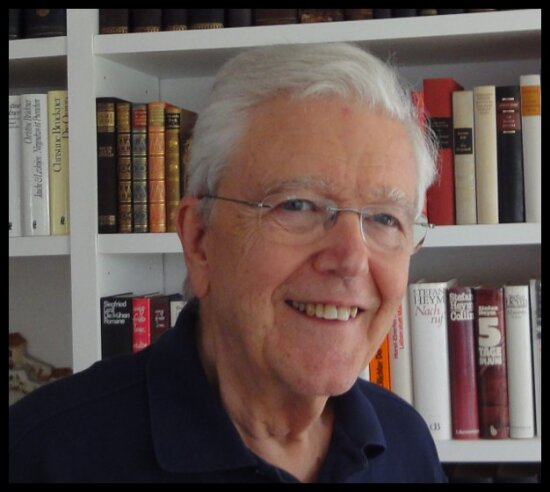
Wir trauern um Prof. Karl Schindler,
dem Gründer des Lehrstuhls Theoretische Physik IV
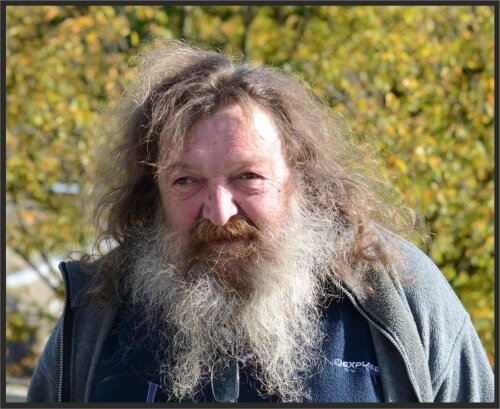
Wir trauern um unseren langjährigen Mitarbeiter Bernd Neubacher

IceCube entdeckt Neutrinos aus der Milchstraße
Einem internationalen Team ist es mit Hilfe des IceCube-Detektors am Südpol erstmals gelungen, Neutrinos aus unserer Milchstraße nachzuweisen. Die Ergebnisse wurde in der Fachzeitschrift Science veröffentlicht.
Pressemitteilung
Press release
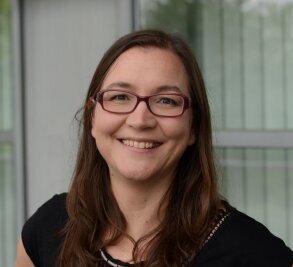
Congratulations to Prof. Julia Tjus
We congratulate Prof. Julia Tjus who received a Jubilee Professorship for 2023 at
Chalmers Technical University in Gothenburg, Sweden
Congratulations to Prof. Wolfgang Rhode and Prof. Francis Halzen
We congratulate Prof. Francis Halzen to his honorary doctorate award and Prof. Wolfgang Rhode who received the honorary professorship.
(from left to right: Prof. Rhode, Prof. Halzen, Prof. Tjus)
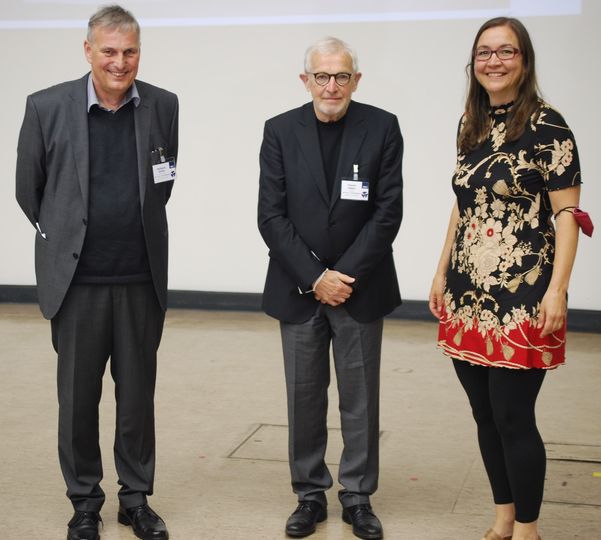
SFB approved
The German Research Foundation (DFG) approved the Collaborative Research Centre (Sonderforschungsbereich - SFB) Cosmic Interacting Matters
Press release RAPP
Press release DFG
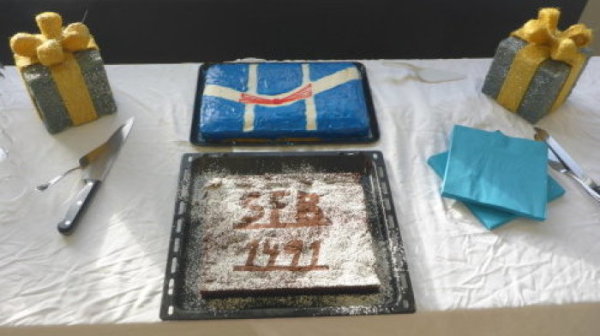
We mourn the loss of our founding member Bernhard Spaan
The founding and the development of the RAPP Center would not have been
the same without him. We will miss him deeply. An obituary
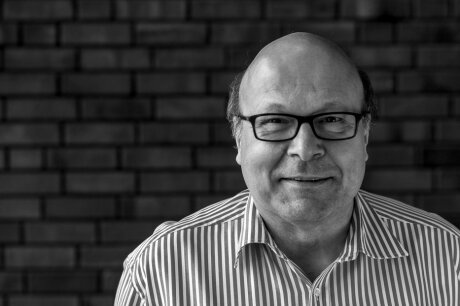
We mourn the loss of Prof. Maxim Polyakov
It is with great sadness that we have learned about the death of our RAPP-PI and college from the Institute of Theoretical Physics at RUB, Maxim Polyakov, who passed away unexpectedly on August 25, 2021
at the age of 55. He will be sorely missed.
Artificial intelligence sharpens the view into space
The new research cluster "NRW Cluster for Data-Intensive Radio Astronomy: Big Bang to Big Data" combines radio astronomy and data science in North Rhine-Westphalia.
Press release RUB
Habilitation of PD Dr. Dominik Elsässer
*** Congratulation to Dominik to his successful habilitation! ***
20.07.2021
PUNCH4NFDI approved
The interdisciplinary consortium "PUNCH4NFDI" will start its work in fall. "PUNCH" stands for "Particles, Universe, NuClei & Hadrons", as the consortium consists of scientists from particle-, astroparticle-, hadron-, nuclear-, and astrophysics. It is coordinated by DESY. The RAPP Center is actively involved in this large-scale effort, with Professors Johannes Albrecht, Kevin Kröninger and Bernhard Spaan from TU Dortmund as applicants, and Professors Hendrik Hildebrandt, Julia Tjus, and Ulrich Wiedner as participants. The insights gained from this interdisciplinary consortium will boost the developments to create a data science platform that serves the entire community. Technically, the platform will consist of a data lake with storage and cloud computing systems, a data transformation layer allowing the analysis of the data, and a user-friendly interface and data portal.
20.07.2021
Astroparticle Physics admitted to Council of German Observatories
The faculty of Physics of TU Dortmund, represented by the Astroparticle Physics (Prof. Rhode), has been admitted to the Council of German Observatories (Rat deutscher Sternenwarten).
Press release TU Dortmund
Dr. Dominik Elsässer was honored with Teaching Award
Dr. Dominik Elsässer was awarded the Teaching Award for outstanding achievements in teaching large digital courses with 60 and more participants. We congratulate Dr. Dominik Elsässer on this award!
Press release TU Dortmund
Successful Plama Theory Day
The digital Plasma Theory Day took place from 11 - 12 January 2021.
Special thanks to all participants for the fruitful scientific exchange.
Please note:
The documents of the Plasma Theory Day are available.
Access data may be obtained from Julia Tjus (julia.tjus[at]rub.de).
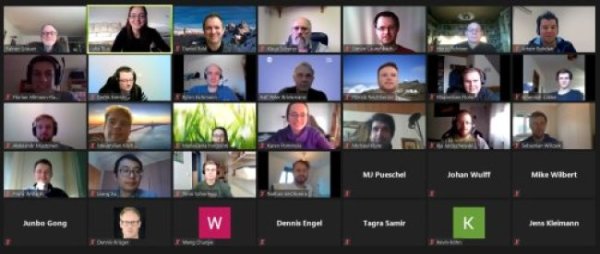
Anna Franckowiak accepts offer for full professorship in Multiwavelength Astronomy
The PIs of the RAPP Center welcome their newest member Anna Franckowiak, who will start as a full professor, taking over the chair "Multiwavelength Astronomy" in October 2020. She will work on the connection of optical, gamma-ray and neutrino emission from Galactic and extragalactic sources and thus contribute in many ways to answering our leading questions. Anna Franckowiak works within the IceCube, Fermi Collaborations and Zwicky Transient Facility (ZTF) Collaborations. She will, when joining Bochum, also extend and shape the Bochum CTA group.
Welcome, Anna!
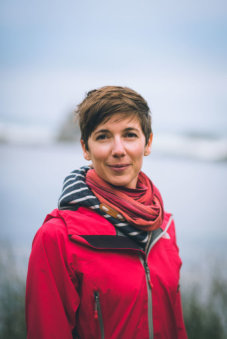
Media response
On 11 July 2018, Prof. Gerhard Wurm's public Blue Square talk was addressed in issue 1175 of the Bochumer Stadt- und Studierendenzeitung (bsz).
The full text is available below.


